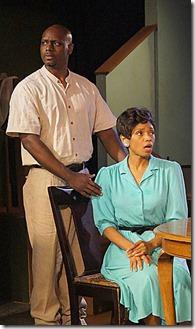
Clybourne Park
Written by Bruce Norris
Directed by Steve Scott
at Redtwist Theatre, 1044 Bryn W. Mawr (map)
thru Nov 10 | tickets: $20-$30 | more info
Check for half-price tickets
Read review
Smart script and dazzling cast make this
a phenomenal must-see
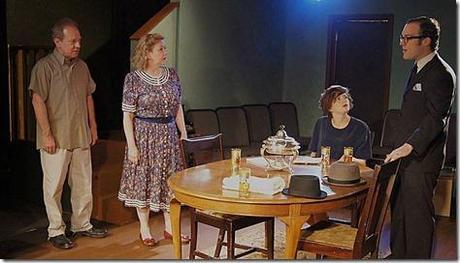
Redtwist Theatre presents
Clybourne Park
Review by Clint May
Watching Redtwist Theatre’s first show of its 2013-14 main season, I was reminded of fellow critic Lauren Whalen’s remark regarding another whip-smart and well-acted production set in Chicago, Superior Donuts: “One of the best things about reviewing theater is finding the hidden gems: hole-in-the-wall storefronts or dusty park district venues that burst with well-kept secrets.” It really is a thrilling experience to walk out of a great show, knowing that when someone asks, “What’s good right now?” that I’ll have an answer on the tip of my tongue. One of the best casts I’ve seen this year paired with a Pulitzer-prize winning script just moved to the top of my list of shows to evangelize this
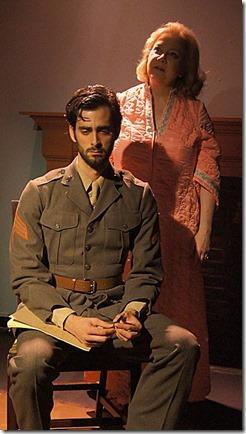
In 1959, Bev (Jan Ellen Graves) and husband Russ (Brian Parry) are preparing to move to a new neighborhood far from Clybourne Park. Their inane yet amusing pretense of comfortable banter—do you really call people from Naples ‘Neapolitans’?—is interrupted by the arrival of their local priest Jim (Michael Sherwin). Long before therapists took over dominion in matters of mental health, it was a priest’s duty to confront touchy matters of the mind: Russ and Bev’s son committed suicide in the upstairs bedroom after returning from the Korean War. Russ has never dealt with the pain of his son’s death and emphatically does not want to, thinking that all this talking is just words better left unsaid. As Jim blithely moves closer to the wound, Russ reacts like a cornered animal, dropping a very un-Father-Knows-Best ‘f’ bomb in his direction. His day doesn’t get any better as Karl Linder* (Pat Whalen) and wife Betsy (Carley Moseley) arrive to inform him of some shocking news. Due to the tragedy that occurred in the house, the price was lowered enough to let a—gasp!–”colored” family to purchase it (another chance for satire as pastor Jim queries about late 50s political correctness, “Don’t we use ‘Negro’ now?”). A heated discussion follows as race relations are brought to the surface right in front of Bev and Russ’ African-American maid Francine (Kelly Owens) and her husband Albert (Frank Pete), who are unwillingly brought into the discussion of whether or not the races can cohabitate peacefully.
Flash forward 50 years, and Karl’s bigoted prediction that a single black family moving into the neighborhood changing everything has proven correct. The ‘tipping point’ was reached quickly, and now the situations are reversed as a white family has moved into Russ and Bev’s old house with the intent to demolish it and make room for a gaudy McMansion. Most everyone in the room is related in some way to the people of Act I. Gentrification is a touchy topic in what has become a now-historic black community. Kevin (Frank Pete) and wife Lena (Kelly Owens) are the delegation from the community sent to evaluate Lindsey (Carley Moseley) and Steve’s (Pat Whalen) architectural intentions and their impact on the flavor of the neighborhood. What starts as a disorganized but mostly amicable discussion of easements and elevations devolves into a discussion of racial tension that pointedly and accurately mimics the conversations of 50 years ago.
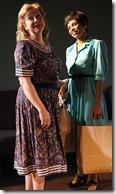 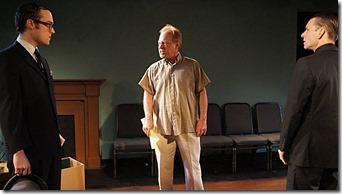
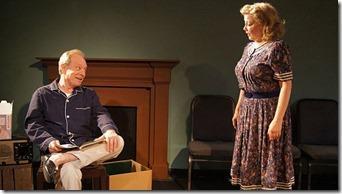 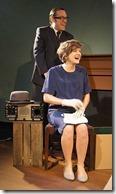
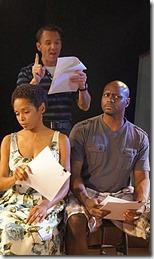 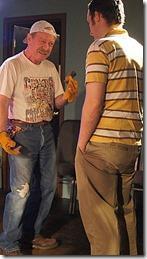 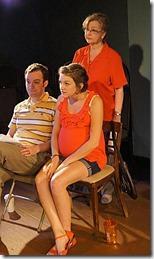 |
So many small moments are telling in Norris’ script. Bev’s patronizing perceived friendship of most egalitarian proportions with Francine and her attempts to give away a chafing dish (“We don’t want your things.” Albert reprimands). A constant discussion of the importance of the past in relationship to a perceived future (it’s noted that the neighborhood was originally German/Irish before it was black to make a point about change and cycles). Steve and Kevin’s argue over humor’s ability to offend. 2009’s conversation begins to expand to include homosexuals and women in a way that 1959’s could not. Is that progress, or just more inflamed tempers in a discussion which has few happy conclusions when people unwilling to see past their own prejudiced noses? A Chekhov’s gun of sorts is literally buried in the past only to be unearthed in the future. What’s inside allows for Norris’ poignant coda to express a sort of naive hope that maybe change for the better is possible.
Rarely have two hours breezed by so quickly. Director Steve Scott keeps the cast perfectly balanced and naturalistic as their veneers are stripped away to reveal hidden ugliness and hypocritical values. Everyone is so on point it’s hard to pick out a favorite, but I loved Redtwist ensemble members Parry and Graves, particularly their 1959 counterparts. Whalen is a well-honed slimeball in both timeframes, moving effortlessly from racist coward to yuppie ignoramus. The award for biggest transformation-in-stride would go to Owens, who must shift from servile maid to vocal community defender.
Such a worthy 21st century successor to one of the most important plays of the 20th, Clybourne Park is a simply brilliant must-see. Staged intimately by Redtwist, there is nary a bad seat to the action as every chair sits in a ring around the action right in the living room. You can really see the spittle fly as circumlocution gives way to bluntness. Between TimeLine and Redtwist, Chicagoans have a rare opportunity to view this diptych on race relations performed by two great ensembles. I can’t help but wonder if I’ll be around to see this become a thematic triptych, and what, if any, progress will be reflected by a future cast carrying on this age-old conversation.
Rating: ★★★★
* Karl is the only character seen in both Clybourne Park and Raisin, as he is the one who attempts to buy out the Youngers in Raisin and prevent them from moving into the neighborhood. The Youngers refuse the offer and set into motion the events that bring about the conversations of 2009.
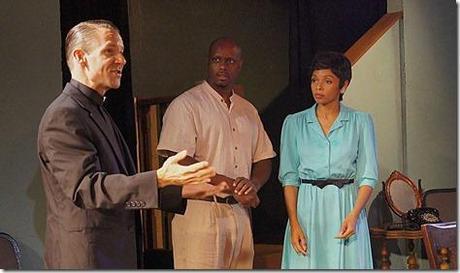
Clybourne Park continues through November 10th at Redtwist Theatre, 1044 W. Bryn Mawr (map), with performances Thursdays/Fridays at 7:30pm, Saturdays/Sundays at 3pm. Tickets are $20-$30, and are available by phone (773-728-7529) or online through BuzzOnStage.com (check for half-price tickets at Goldstar.com). More information at Redtwist.org. (Running time: 2 hours, includes an intermission)
Photos by Kimberly Loughlin
artists
cast
Jan Ellen Graves (Bev, Kathy), Carley Moseley (Betsy, Lindsey), Kelly Owens (Francine, Lena), Brian Parry (Russ, Dan), Frank Pete (Albert, Kevin), Michael Sherwin (Jim, Tom), Kaelan Strouse (Kenneth), Pat Whalen (Karl, Steve)
behind the scenes
Steve Scott (director), Jude Hansen (asst. director), Allison Queen (stage manager), Olivia Leah Baker (asst. stage manager), Ross G. Hoppe (set design, tech director), Eric J. Vigo (lighting design), Christopher Kriz (sound design), Olivia Leah Baker (costume design), Jeff Shields (props design), Kevin McDonald (dramaturg), Jessie Chappe (casting director), Jan Ellen Graves (co-producer, graphic designer), Charles Bonilla (box office manager), E. Malcolm Martinez (box office associate), Johnny Garcia (box office associate, associate producer), Michael Colucci (co-producers), Kimberly Loughlin (photos)
13-1011

